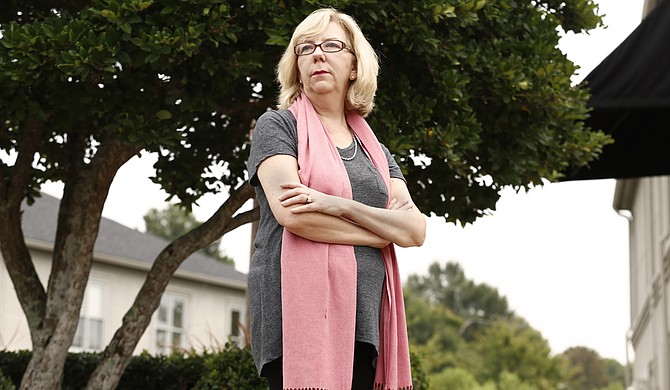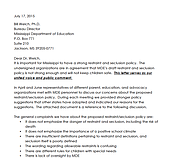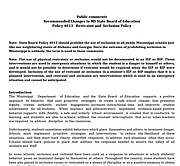Joy Hogge, executive director of Families as Allies, is one of several advocates asking the Mississippi Department of Education to strengthen its Restraint and Seclusion policy before implementing it. Photo by Imani Khayyam.
Cedric Napoleon, 14, hadn't eaten lunch that day in 2002. The special-education student had gotten in trouble that morning and been punished with a "delayed lunch." At 2:30 p.m., he tried to get up out of his chair and leave, but his teacher pushed him back into and tried to hold him there. The small boy kept struggling, so the teacher—who was 6 feet tall and weighed 230 pounds—put him face down on the floor in a "prone restraint" and then sat on him. He struggled, saying repeatedly: "I can't breathe."
"If you can speak, you can breathe," his Killeen, Texas, middle-school teacher snapped at him.
Shortly after that, Cedric stopped speaking and struggling. He stopped moving at all. The teacher however kept sitting on him, and then propped him up, and her aide wiped drool off his face.
He then fell over and died in front of a classroom of students before his foster mother got to the school.
Toni Price gave this testimony about her foster son, Cedric, in front of the U.S. House Education and Labor Committee in 2009. Cedric had suffered from behavioral problems after a rough childhood during which his birth parents had starved him, forcing him to dig through trashcans for food.
Price was one of many parents who came forward following a Government Accountability Office investigation that detailed several deaths of children in schools who died due to use of a restraint and children hurting themselves when secluded. A U.S. Department of Education study in 2012 found that restraint or seclusion was used on 110,000 students nationally, but this number is likely low because several states don't track data consistently.
Since the 2009 GAO report, states began to adopt policies. Federal leadership has largely left restraint and seclusion policies up to individual states to adopt. Mississippi is one of five states that do not have a statewide policy or voluntary guidelines. But things are changing.
In June, the Mississippi Department of Education drafted a restraint and seclusion policy that is already under tough scrutiny by parent, education and advocacy groups around the state. The organizations fully support the creation and implementation of a policy, but they are not satisfied with the policy as it is written now.
The review process for Policy 4013 began in June, when advocates stepped in and asked for an extension of the time period for review. The ACLU asked for an oral proceeding in early July.
Critics: Policy Too Lenient
On July 17, the ACLU of Mississippi, Families as Allies, the Coalition for Citizens with Disabilities, and several other advocacy groups, parents and individuals filed a joint public comment voicing their concern with the proposed policy: primarily, that it's too lenient, and still allows seclusion as a means of punishment in schools.
Policy 4013 is seven pages long and outlines restraint and seclusion procedures, training and documentation requirements, and administrative procedures for school districts to follow. The coalition of organizations drafted a proposed policy that is 13 pages long.
Advocates are concerned that the policy up for approval is not strong enough to keep children safe because a lot of the required trainings and data collection will be the responsibility of individual districts—not the state. As a part of their proposed policy and public comment, the coalition of organizations conducted their own 400-person poll and used the findings in their public-comment letter, hoping to enhance the current draft of the proposed policy.
Their survey revealed that restraint and seclusion were being used to control behavior instead of when a child is in danger. Advocates fundamentally believe that restraint and seclusion should only be used as a last resort, if the child is in danger—not as a substitute for other disciplinary procedures.
In order for a teacher to use a restraint or seclude a student, they are supposed to be trained under the state's proposed policy, but the MDE does not provide a list of evidence-based trainings or give any names of potential trainings, leaving districts that have no knowledge of the policy in the dark.
Joy Hogge, executive director of Families as Allies, said this could be problematic for school districts.
"You run the risk of a school district trying to do due diligence (choosing a training on their own), and maybe it's somebody that's not qualified," she said.
Proper training leads to successful implementation, preventing situations where a teacher like Cedric's go too far in their restraint. Training is also crucial to serve the special-education student population, who may or may not be able to voice their discomfort or pain clearly.
"We know that children with special needs are more likely to experience restraint and seclusion, so that makes it even more important that any policies related to it are kept in best practice," Hogge said.
The ACLU and the Coalition agree that seclusion should not be allowed in schools. Some use seclusion as a form of punishment, leaving a child alone in a designated room—often unsupervised.
Hogge said that if seclusion has to be used, a padded room that does not endanger the student in any way must be designated, and that students should not be left unsupervised at anytime.
The 2009 GAO report included grim stories of students hurting themselves while in seclusion without supervision. MDE's policy allows regulated seclusion.
"There's no circumstance in which it seems to be warranted and which the safety of the child can be guaranteed," Hogge said. "It's too easy for the child to end up hurting themselves in a seclusion room."
Seclusion: Controversial and Ineffective?
Seclusion used in public schools as a means of discipline has always been controversial, but in the past few years, the ACLU has been pushing the Department of Education to adopt a policy. Rene' Hardwick is heading up its initiative to change policy in the state.
Hardwick said MDE might not prohibit seclusion, but that doesn't mean individual districts cannot write it into their own policies. MDE will set the bare-minimum standards Hardwick said, by regulating training and setting procedures for recording incidents. School districts can go above and beyond with their own policies as long as they align with the department's overarching framework.
Jackson Public Schools adopted its own restraint and seclusion policy in February of this year. District spokesman Sherwin Johnson said the implementation plan is still in development. Training and implementation have not been completed, but are still ongoing.
Hardwick is pushing MDE to bring educators in to discuss the policy, as well as organizations because they are the ones with the knowledge, skills and experience to back up things they think will work and things they think won't.
"Until you have educators at that table, MDE, your policy is not going to be effective," she said.
Hardwick submitted model policies to Sunflower and Harrison county school districts.
The Mississippi Department of Education does not keep track of which school districts have developed their own restraint and seclusion policies, and currently, there is no system in place for the department to monitor the schools at all. Advocates from more than 14 organizations had been pushing for such a policy.
The ACLU started working with the Department of Education as early as 2009 to implement one, but meetings with advocates and the ACLU that started in March have finally set the policy in motion.
On Sept. 30, a public comment proceeding on the restraint and seclusion policy will be at 10 a.m., at the Mississippi Schools for the Blind and Deaf Auditorium.
Correction: An earlier version of this story improperly named Sherwin Johnson as Jonathan Sherwin. We apologize for any confusion this may have caused.




